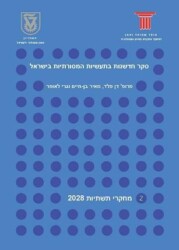On March 20, 2008 a report entitled “Israel 2028: Vision and Strategy, Economy and Society in a Global World” was submitted to Prime Minister Ehud Olmert, to be adopted by the Government of Israel as a national strategy. The report was initiated and sponsored by the USA Israel Science and Technology Commission (USISTC), led by a Steering Committee which included Gen. (ret) Yitzchak Ben-Israel, MK, Mr. Sami Friedrich, CEO of Shaldor, Prof. Joshua Jortner, University of Tel Aviv and former President of the Israeli Academy of Sciences and Humanities, Mr. Raphael Maor, CEO of ECI Telecom, Dr Eli Opper, Chief Scientist of the Ministry of Industry, Mr. David Myron Wapner, Director, USISTC, Prof. Zehev Tadmor, COB of the S. Neaman Institute, and Mr. Yoram Yahav, Director of TIM Technion Institute of Management. The Commission was headed by Mr. Eli Hurvitz, COB of Teva and directed by Mr. David Brodet, former Director General of the Ministry of Finance. The work was carried out over a period of two years by some 60 experts from the business sector, government and academy, in nine working groups, five of which were at the S. Neaman Institute. The Institute matched the expenses of the work done under its auspices.
This national strategic plan integrates economic and social factors designed to meet the following mission statement: The State of Israel will be among the world’s ten to fifteen leading countries in terms of income per capita; it will strive for the good of all its citizens, their quality of life and the future of its young generation. Israeli society will be open and enlightened; its economy will be free, balanced and fair and will rely on Israel’s cultural and scientific/technological capabilities, the wealth of its human capital, on innovation and initiative. The State will achieve all of this through collaboration of all of its sectors, while maintaining its values and strengthening Israel’s image in the eyes of its citizens, and its partners in the Jewish world.
The completed report is a landmark in that, for the first time, a sound national/economic/social vision and strategy was presented to the government and has a chance of being implemented. We at the S. Neaman Institute are proud of having played a key role in formulating such a national strategy.
Fortuitously, the report was completed just in time for Israel’s 60th anniversary of independence, which is a time for contemplation and soul searching regarding our future. Much has been accomplished in 60 years, yet much more is to be done. Without a coherent, comprehensive national strategy along the lines described in this report, Israel’s future may be at risk.
Israel, the report concludes, cannot survive for long under its current “dual economy”- consisting on one side of a relatively small world-class, high efficiency, high-tech sector (the “locomotive” of the economy), and a much larger, inefficient low-tech and service sector on the other. Such an economy (and society) is inherently instable and cannot provide the kind of GDP per capita Israel needs for a strong, sustainable economy, nor can it provide the standard of living of a developed country or secure its significant defense needs. Moreover, a “dual” economic structure inevitably leads to a split society consisting of a well-to-do minority (in the center of the country) and a vast and frustrated low-income majority (in the periphery) living outside the boundaries of success and well-being. This growing socio-economic gap leads to a non-cohesive, instable society and carries within it a time-bomb waiting to explode.
One of the important findings of this report is that the economic necessity for reaching a GDP per capita on par with that of a developed nation – which mandates the abolition of the dual economy by sharply increasing the productivity of the traditional industries and services – also automatically leads to a narrowing of the huge socio-economic gap in our society, bringing about greater cohesion and stability. What morality, empathy, and decency could not bring about, perhaps cold and pragmatic economic necessity will.
The report further observes that the current success of the Israeli economy, or rather the high-tech sector, from a historical perspective, may end up as a transient mirage unless a proper national strategy, as recommended in the report, is adopted. The economy rests, by and large, on ICT (information/communications technologies) or rather electronics/computers/communication (ECC) based industries. This is the result of 50 years of investment in the defense infrastructure (with its strong foundation in ECC or ICT). The next wave of high technologies, however, will emanate from other disciplines such as life sciences, molecular biology, nanotechnologies, material sciences, chemistry, and pharma with roots in the basic research laboratories of the universities as opposed to the defense industries. Out of these laboratories are emerging both new technologies as well as skilled graduates who can handle, adopt and promote them, whether developed in Israel or imported from the rest of the world. Even the next stages of ICT will increasingly be coming from the basic sciences, as is the case with quantum computing. Yet in the absence of a national policy for the universities, let alone for the entire higher education system, it is not clear how these institutions will be able to supply the knowledge, skills and human resources needed to abolish the dual economy.
The report also addresses the inadequacy of current labor policies and the public service sector in handling the kind of radical changes needed to implement a new national strategy, and the lack of planning infrastructures within the government ministries to adopt and implement such plans.
The report concludes that Israel has a totally insufficient physical infrastructure for sustaining a modern, vibrant economy, and a devastatingly bad record regarding environmental concerns and protection. Rectifying these shortcomings demands a giant investment which will have to be made to meet the national goals. Finally, the report places all the above conclusions in the perspective of the global world and markets we live in, with appropriate recommendations.
The work performed by the Institute related to this report is briefly outlined in the following sections:



